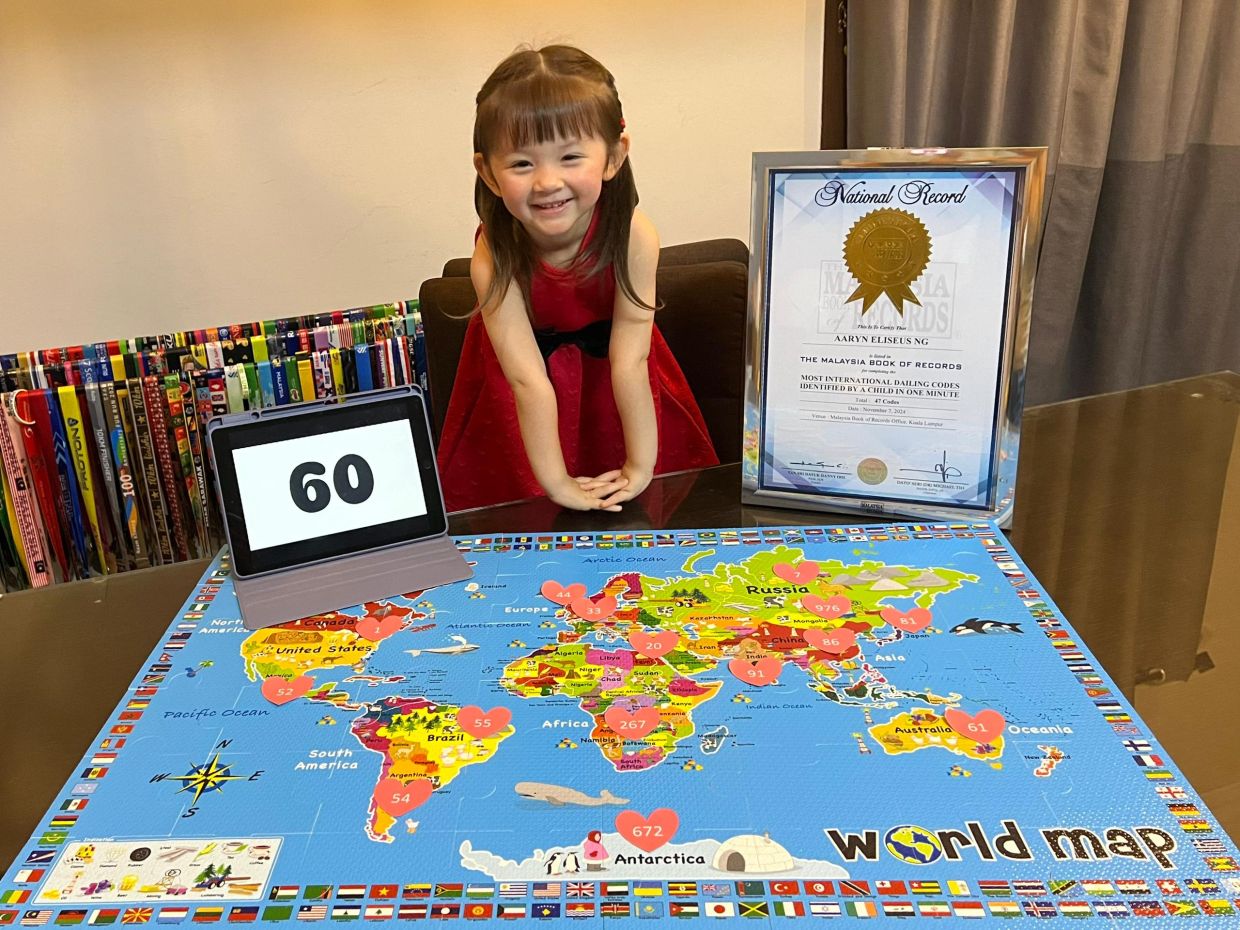Aaryn earned a Malaysia Book of Records title for identifying the most international dialling codes in 60 seconds. Photos: Erica Ng Joe Yin
Two years ago, at 24 months, Aaryn Eliseus Ng was believed to have a speech delay. Now, at three years and 11 months, the preschooler from Kajang, Selangor has earned a spot in the Malaysia Book of Records (MBR) for the "Most International Dialling Codes Identified by a Child in One Minute."
Aaryn recognised the country calling codes from 47 countries under 60 seconds.
Her mother Erica Ng Joe Yin, 35, is thrilled with her daughter's feat.
"I'm incredibly proud of Aaryn for achieving this record. It is an unexpected milestone, and I'm glad to see her potential shine through despite her challenges with articulation," said Ng in a phone interview from Bandar Sungai Long in Kajang recently.
Country dialling codes, also known as international dialling codes or country calling codes, are numerical prefixes used to connect to phone numbers in different countries. Each country has a unique code, which must be dialled before the local phone number when making an international call. For example, the code for Malaysia is +60, and for Britain, it is +44. These codes ensure that the call is routed correctly to the intended country.
Last year, Aaryn's twin sibling Aavyn Eliseus Ng earned a place in the MBR for recognising 40 flags within 60 seconds. The young boy was two years and four months when he was first exposed to the Jalur Gemilang, followed by India's national flag. Five months later, he secured the record. "I am equally proud that both my twins now hold an MBR," the businesswoman shared proudly.
Aaryn developed an interest in country codes when Ng trained Aavyn to recognise flags on flash cards last year. Back then, Aaryn did not speak much.
"Early this year, Aaryn began to develop better communication skills. Two months ago, she suddenly pointed at a flag and named it. I tested her with all the flags, and to my surprise, she knew them all. I could not believe she could read, so I gave her a book that same night, and I found out she knew how to read words.
"That was when I decided to challenge her with country codes by writing them next to the country names. I then transferred the codes to the iPad and practised with her. Surprisingly, she managed to name them without looking at the country names."
Two weeks prior to the MBR attempt, Aaryn had practised memorising flags three times a day, about five minutes each time, Ng explained.
"I didn’t provide much formal training since Aaryn secretly learned alongside her brother. I only had her sit beside her brother when I introduced him to flags last year and read them storybooks at night. That's all.
"In fact, she was the one who led me to discover her talent, which encouraged me to introduce more things to her, including country codes. Credit should be given wholly to her for being eager to learn whenever I introduced something new. I learned a lot from and through her as well."
Ng added that the MBR officials initially tested her daughter using a computer screen, but she was not used to it, so they switched to the iPad, and she nailed it.
Ng believes that early intervention is crucial for children with speech delays. Addressing the issue at an early age can significantly reduce long-term challenges and improve their ability to communicate effectively.
"As a parent, you have to trust the process, even when things feel uncertain. Aaryn is naturally calm and loves to read. She is very sensitive to words and numbers, which allows her to focus and learn things related to these areas. Aavyn, on the other hand, is a typical boy and he is always up to mischief. He keeps me on my toes."
Ng has no plans to sign up her twins for more record-breaking feats. For the time being, she wants them to lead normal lives, and grow up as active young preschoolers.
"I just hope that Aaryn and Aavyn grow up healthy and happy, exploring more and finding their interests along the way."
A numerical feat
Aaryn earned a Malaysia Book of Records title for identifying the most international dialling codes in 60 seconds. Photos: Erica Ng Joe Yin
Record-breaking siblings: Aaryn (left) and her twin brother, Aavyn, both hold Malaysia Book of Records titles at such a young age.
Photo: Erica Ng Joe Yin
According to Ng (left), early intervention has helped Aaryn overcome communication challenges.
Photo: Erica Ng Joe Yin
Through consistent practice, Aaryn has strengthened her memory skills, helping her achieve the feat.
Photo: Erica Ng Joe Yin









